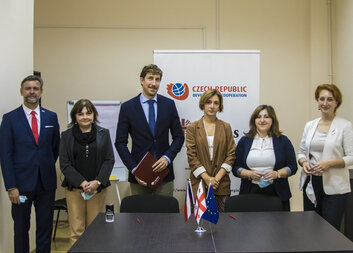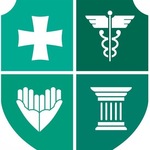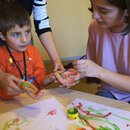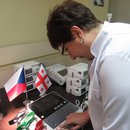Although the deinstitutionalization process in Georgia began in 2011, it still has not been finished. In 2020, thanks to the financial support from Czech Development Agency, Caritas Czech Republic elaborated a deinstitutionalization strategy and an action plan in close cooperation with the Ministry of Health of Georgia, and took the responsibility to provide community-based homes and services for persons with disabilities (PWDs) living in two large boarding homes under the state care.
Why Deinstitutionalization Matters
Every human being has a right to have decent living conditions and to be fully integrated into society. Unfortunately, in Georgia, most persons with disabilities under the state care, still live in large boarding institutions where their rights are often violated, and their individual needs and desires are neglected.
At the initiative of the Agency for State Care and Assistance for the Victims of Human Trafficking, Caritas Czech Republic has developed the necessary strategy and action plan for deinstitutionalization process in Georgia. Our experts of the field, in close cooperation with Czech colleagues and project partners’ representatives, identified the main areas of work, assessed the needs of the target beneficiaries, and prepared relevant legislative initiatives. As a result, at the beginning of 2022, some of the beneficiaries living in large boarding houses in Dusheti and Martkopi, will move to two new family-style homes that are currently under rehabilitation.
Eventually, the deinstitutionalization process meaning provision of community-based homes and services for persons with disabilities, will change the lives of 112 adults – stepwise, according to their individual needs and will.
Importance of Small Family-Type Homes
Maia Shishniashvili, the founder of the social inclusion organization Hand in Hand, a chair of the Coalition of Parents' Organizations and Caritas Czech Republic project expert, says that in the process of deinstitutionalization, the so-called alternative service and the “Person-centered” approach are crucial. The cornerstone of the latter is the interests, desires, personal characteristics, and capabilities of an individual. According to her, a service should not dictate a person what is best for him or her, but on the contrary, a service provider should ensure what is necessary for the quality life of an individual, considering their rights and individual wishes:
"Years ago, due to my son's condition, I realized that I had to think about his future to enable him to live without me with dignity. Persons with any special needs must stay in a community, just like others. This is a modern, dignified, and correct approach. The service provided by Caritas Czech Republic with the support from Czech Aid will offer a beneficiary an alternative family-type home in which a person is not depersonalized, and he or she lives in a community, just like everyone else.”
Role of State Institutions in Deinstitutionalization
The Public Defender of Georgia often speaks about the importance of the deinstitutionalization process and the legal status of persons with disabilities, saying that the rights of these people are often violated. Nino Lomjaria states that they do not have proper access to education, employment, and job opportunities. Also, there are frequent incidents of violence between beneficiaries in large institutions.
Meri Maglaperidze, director of State Care Agency, explains that despite years of efforts by the agency to provide quality services to beneficiaries in such large boarding houses as in Dusheti and Martkopi, it was difficult to achieve the goal:
"There is no possibility of individual approach in large institutions. About 70 people live together, which is harmful to each of them. The risks of violence are also increased. Systemic change is necessary because, unfortunately, there are persons with disabilities who do not have the opportunity to live in a family and need family-type care and the home itself. That is the starting point!
This project is an especially valuable achievement for us, and Caritas Czech Republic is one of the most important partners for the agency."
In the light of that, Maglaperidze emphasizes the importance of a new approach to assessing the needs of beneficiaries, which evaluates not only their medical condition, but also their individual interests and desires. Thanks to the collaboration with Caritas Czech Republic, the Agency has been already implementing this approach into the practice. Moreover, Maglaperidze believes that the small family-type homes created under Caritas Czech Republic project will be a model of what the country should offer to persons with disabilities in the future.
"Despite Caritas Czech Republic's and Czech Aid’s invaluable support, the country has the most important role in the whole process” adds Irine Oboladze, the representative of the Ombudsman's Office. She explains that the donor contribution to the deinstitutionalization process is not enough unless the country continues the provision of the above-explained modern services for persons with disabilities left without families after the project ends.
Caritas Czech Republic Advocates for the Rights of Persons with Disabilities
In response to the initiative of the State Care Agency, Caritas Czech Republic implements the project – Way to Home: Development of Adult Alternative Social Services in Georgia, funded by the Czech Development Agency since 2020.
The project includes the creation/update of a normative framework for the establishment of adult family-type services, development of infrastructure for new services, an effective transformation of beneficiaries, and awareness-raising activities about the importance of deinstitutionalization. In total, 47 beneficiaries of Dusheti and 68 beneficiaries of Martkopi boarding houses, as well as 115 employees of the same facilities will benefit from the project.
"Participating in the deinstitutionalization process is a huge responsibility for Caritas Czech Republic and implies a complex approach. Our project aims not only to support the country in deinstitutionalization process and change the lives of particular people living in large institutions, but aims at social transformation as a whole, with a proper understanding of the issue and values by the general public." – noted Tamar Kurtanidze, Caritas Czech project manager, while adding that "this process requires time, public readiness, change of attitude, and a good understanding that all people have an equal right to be a full member of society, to enjoy equal benefits, and contribute to the development of public life. I would like to thank our donor for funding such a state-important project."
Prepared by Nina Kopaleishvili – Caritas Czech PR and Communication Officer, nina.kopaleishvili@caritas.cz








